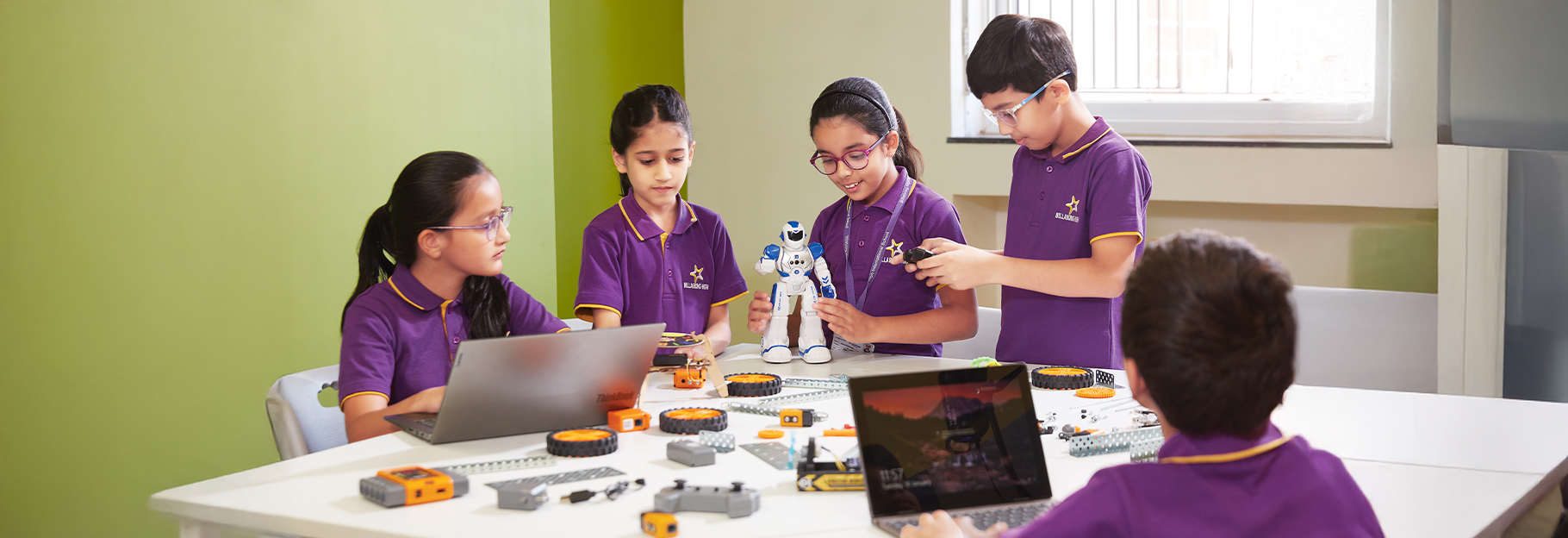The Impact of K-12 Education on Your Child's Future Growth
In this day and age, K-12 education has a very decisive role to play in the overall growth story of any child. Understanding the intricate dynamics of the K-12 education system helps parents and guardians aim to provide the best possible start for their children. Through this blog, we will be taking a look at the multifaceted impact of K-12 education on a child's growth, emphasising the role of holistic education, collaborative learning approaches, and inclusive learning environments.
The Foundations of K-12 Education
K-12 education, encompassing kindergarten through Grade 12, lays the groundwork for a child's academic, social, and emotional development. This period is critical for instilling essential skills such as critical thinking, problem-solving, and effective communication. According to the National Center for Education Statistics, students who receive a robust K-12 education are more likely to pursue higher education and secure well-paying jobs.
Academic Excellence and Beyond
The K-12 education system is designed to provide comprehensive academic training across various subjects, including mathematics, science, language arts, and social studies. However, its impact extends beyond academics. A well-rounded K-12 education fosters creativity, adaptability, and a lifelong love for learning. Research indicates that students engaged in diverse learning activities exhibit improved cognitive abilities and better academic performance.
Holistic Education: Nurturing the Whole Child
Holistic education is a fundamental aspect of the K-12 education system, aiming to develop the intellectual, emotional, social, physical, and spiritual dimensions of a child. This approach recognises that each child is unique, with distinct strengths and potential. By addressing these varied aspects, holistic education promotes overall well-being and personal growth.For instance, integrating arts, physical education, and mindfulness practices into the curriculum enhances emotional intelligence, reduces stress, and fosters a positive self-image. According to a study by the American Psychological Association, students participating in holistic education programs show significant improvements in emotional regulation and interpersonal skills.
The Role of Collaborative Learning
A collaborative learning approach is another cornerstone of effective K-12 education. This method involves students working together in groups to achieve common goals, encouraging teamwork, communication, and problem-solving skills. Collaborative learning not only enhances academic understanding but also prepares students for real-world challenges where cooperation and collaboration are essential.
Research from the University of Illinois highlights that students engaged in collaborative learning environments exhibit higher academic achievement and better retention of knowledge. Moreover, this approach nurtures social skills and fosters a sense of community within the classroom.
Inclusive Learning Environments: Celebrating Diversity
Creating an inclusive learning environment is pivotal in the K-12 education system. Inclusive education ensures that all students, regardless of their abilities, backgrounds, or learning styles, have equal access to quality education. This approach celebrates diversity, promotes empathy, and prepares students to thrive in a multicultural world.
Preparing for Higher Education and Career Success
The impact of K-12 education on a child's future growth is evident in their preparedness for higher education and career success. Having good K-12 skill sets and knowledge can help students gain a massive advantage when it comes to entering college and job markets. Moreover, the emphasis on critical thinking, creativity, and problem-solving in the K-12 education system aligns with the demands of the modern workforce. Employers increasingly seek individuals who can adapt to changing environments, work collaboratively, and contribute innovative solutions.
The Economic and Social Impact
Investing in K-12 education has far-reaching economic and social benefits. Educated individuals are more likely to contribute positively to society, engage in civic activities, and promote social cohesion. Additionally, higher levels of education are associated with lower crime rates, better health outcomes, and increased economic productivity.
A report by the Organisation for Economic Co-operation and Development (OECD) highlights that countries with well-developed K-12 education systems experience higher economic growth and improved quality of life.
The Role of Parents and Guardians
Parents and guardians play a crucial role in maximizing the impact of K-12 education on their child's future growth. Active involvement in a child's education, such as attending parent-teacher conferences, supporting homework routines, and encouraging extracurricular activities, significantly enhances academic and personal development.
Research indicates that students with engaged parents are more likely to perform well academically, exhibit positive behaviour, and pursue higher education. By fostering a supportive home environment and maintaining open communication with educators, parents can help their children navigate the challenges and opportunities of the K-12 education system.
Embracing Technology in K-12 Education
The integration of technology in the K-12 education system has revolutionized the learning experience. Digital tools and resources provide students with access to a wealth of information, interactive learning experiences, and personalised instruction. This technological shift has enhanced the effectiveness of collaborative learning approaches and inclusive learning environments.
A study by the Pew Research Center reveals that students using technology in their education exhibit improved engagement, motivation, and academic performance.
In Conclusion
There’s no denying the fact that the impact K-12 education has on your child's future growth is profound and multifaceted. By providing a solid academic foundation, promoting holistic education, embracing collaborative learning approaches, and fostering inclusive learning environments, the K-12 education system prepares students for a successful and fulfilling life. As parents, educators, and policymakers, it is our collective responsibility to support and enhance this critical stage of education, ensuring that every child has the opportunity to reach their full potential.

20 Comment
Mangesh Sawant
Lorem ipsum, dolor sit amet consectetur adipisicing elit. Sed, velit officiis. Dolorum, deleniti necessitatibus nostrum labore quo soluta sed tempora ea, nam eaque sint, nemo rerum molestias vitae ratione porro?